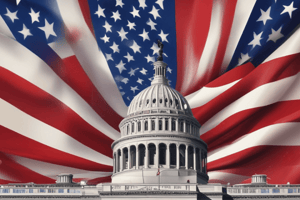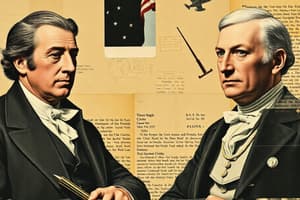Podcast
Questions and Answers
What is a caucus?
What is a caucus?
- A type of election
- A meeting of local party members to choose party officials or candidates (correct)
- A method of fundraising
- A political party's platform
What is a direct primary?
What is a direct primary?
A primary where voters directly select the candidates who will run for office.
What are economic protest parties?
What are economic protest parties?
Parties rooted in poor economic times, lacking a clear ideological base, dissatisfied with current conditions and demanding better times.
What are factional parties?
What are factional parties?
What marked the First Party System?
What marked the First Party System?
Who were the Mugwumps?
Who were the Mugwumps?
What is the role of the national chairman?
What is the role of the national chairman?
What is the national party convention?
What is the national party convention?
What did the Old Guard control?
What did the Old Guard control?
What are single issue parties?
What are single issue parties?
What is the plurality system?
What is the plurality system?
What is a political machine?
What is a political machine?
What is a political party?
What is a political party?
What characterized the second party system?
What characterized the second party system?
What are special interest caucuses?
What are special interest caucuses?
What is the winner-takes-all system?
What is the winner-takes-all system?
Flashcards are hidden until you start studying
Study Notes
Political Structures and Processes
- Caucus: Local party assemblies where members select officials or candidates and define the party platform.
- Direct Primary: A primary election where voters choose candidates directly for the upcoming election.
- Plurality System: An electoral method where the candidate with the most votes wins, even without a majority; prevalent in American elections.
Types of Political Parties
- Economic Protest Parties: Emergence tied to economic hardship, advocating for change without a strict ideological foundation.
- Factional Parties: Result from splits within major parties, differing in ideology or strategy.
- Single Issue Parties: Focus solely on one specific public policy issue rather than a broader agenda.
Historical Context
- First Party System: Initiated in 1792, featuring the rivalry between Federalists and Republicans, born from fears of Federalist dominance.
- Second Party System: Formed around Andrew Jackson's candidacy in 1824, marking a shift towards mass political engagement.
- Mugwumps: A faction of Republicans who defected to support Democrat Grover Cleveland in the 1884 presidential election.
Political Organization and Leadership
- National Chairman: Elected leader responsible for daily operations of the party, guiding strategy and management.
- National Party Convention: A quadrennial event for delegates to nominate presidential/vice-presidential candidates, ratify party platforms, and set rules.
Political Dynamics
- Political Machine: Highly organized groups controlling elections through patronage, ensuring loyalty by trading jobs and favors for votes.
- Old Guard: Conservative faction within the Republican Party that opposed progressive reforms, aligning with William Howard Taft during factional disputes.
Electoral Systems
- Winner Take All System: In electoral contexts, the system grants all electoral votes to the candidate with the most votes in a state, centralizing power in majorities.
Representation and Inclusivity
- Special Interest Caucus: Groups within political structures focused on representing specific minority groups, ensuring their voices and concerns are addressed.
Studying That Suits You
Use AI to generate personalized quizzes and flashcards to suit your learning preferences.





